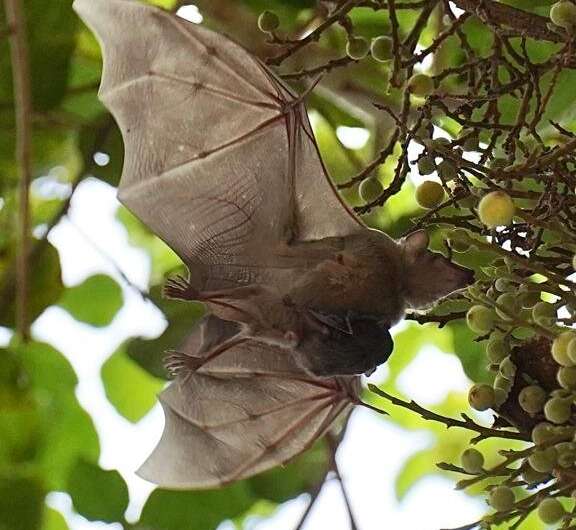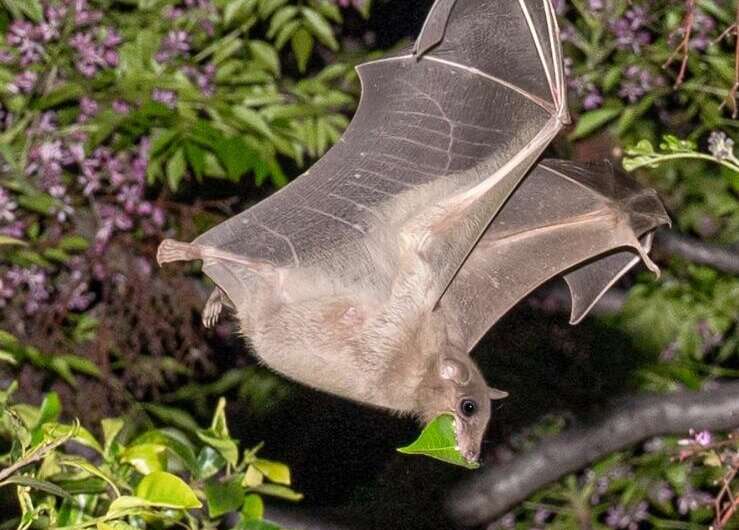Sick bats also employ 'social distancing' which prevents the outbreak of epidemics

The COVID-19 pandemic has introduced us to expressions like 'lockdown', 'isolation' and 'social distancing', which became part of social conduct all over the world. Now it appears that bats also maintain social distancing which might help prevent the spread of contagious diseases in their colonies. In a new study published in Annals of the New York Academy of Science, researchers from Tel Aviv University demonstrate that sick bats, just like ill humans, prefer to stay away from their communities, probably as a means for recovery, and possibly also as a measure for protecting others. The study was conducted by postdoctoral researcher Dr. Kelsey Moreno and Ph.D. candidate Maya Weinberg at the laboratory of Prof. Yossi Yovel, Head of the Sagol School of Neuroscience and a researcher at School of Zoology at the George S. wise Faculty of Life Sciences.
The study monitored two colonies of Egyptian fruit bats—one living in an enclosure and the other in its natural environment. To examine the behavior of bats when they get sick, the researchers injected several bats in each group with a bacteria-like protein, thereby stimulating their immune response without generating any real danger to the bats. Tests revealed symptoms such as a high fever, fatigue and weight loss, and the 'ill' bats' behavior was tracked with GPS.
The researchers discovered that the 'sick' bats chose to keep away from the colony. In the first group, they left the bat cluster of their own accord and kept their distance. In the second group the 'ill' bats likewise moved away from the other bats in the colony, and also stayed in the colony and did not go out in search of food for two successive nights.
Research student Maya Weinberg explains that this social distancing behavior is probably caused by the need to conserve energy—by avoiding the energy-consuming social interactions in the group. Weinberg emphasizes, however, that this behavior can also protect the group and prevent the pathogen from spreading within the colony. Moreover, the fact that sick bats don't leave the cave, prevents the disease from spreading to other colonies. "The bats' choice to stay away from the group is highly unusual for these animals. Normally these bats are extremely social creatures, living in caves in very crowded conditions," says Weinberg. "In fact, the 'sick' bats' behavior is very reminiscent of our own during recovery from an illness. Just as we prefer to stay home quietly under the blanket when we are ill, sick bats, living in very crowded caves, also seek solitude and peace as they recuperate."

Prof. Yovel adds that the study's findings suggest that the likelihood of bats passing pathogens to humans under regular conditions is very low, because sick bats tend to isolate themselves and stay in the cave. "We observed that during illness bats choose to stay away from the colony and don't leave the cave, and thus avoid mixing with other bats. This suggests that in order to encounter a sick bat, people must actually invade the bats' natural environment or eliminate their habitats. In other words, if we protect them, they will also protect us."

More information: Kelsey R. Moreno et al, Sick bats stay home alone: fruit bats practice social distancing when faced with an immunological challenge, Annals of the New York Academy of Sciences (2021). DOI: 10.1111/nyas.14600
Provided by Tel-Aviv University




















